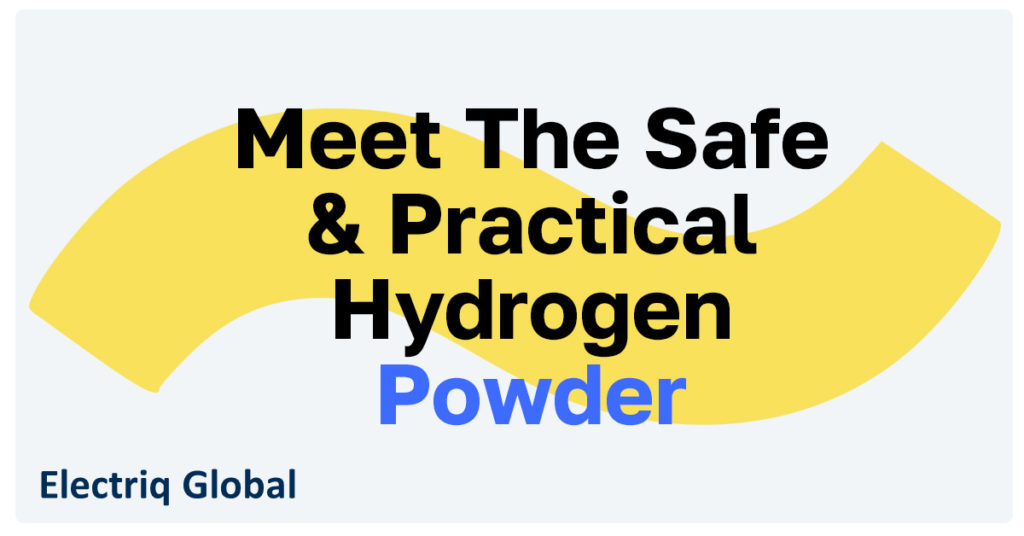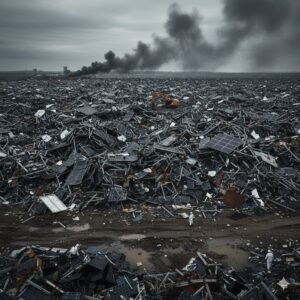Cover photo by HowToGym on Unsplash
Hydrogen, as a clean energy source, is seen as a silver bullet against fossil fuels, but its widespread adoption requires overcoming a few obstacles along the way. Safety, transport, and storage are the most common challenges when it comes to scaling up production and distribution. Whatever method used to make hydrogen, the final output is gas. Because of its low boiling point (-252 °C) and low melting point (-259 °C), it is complicated to transport and store hydrogen in its liquid or solid state. Not to mention the risks involved; hydrogen is highly flammable. Regarding transport, engineers are working on repurposing the existing gas pipelines, but storage remains in high-pressure cylinders. An Israeli company named Electriq has come up with a solution that may solve the shipping and safekeeping issues.
Today’s Focus of Attention is reader-supported. We sometimes include products we think are useful for our readers. If you buy through links on this page, we may earn a small commission.
Turning Hydrogen Into Powder

Electriq figured out how to turn hydrogen into an inert, non-flammable powder that can be shipped safely and transformed into a liquid by pressing a button, just like making a cup of coffee. This is good news since anyone with a generator could be a potential hydrogen-powdered consumer, whether it is to switch from diesel, backup power, or green energy. Electriq hopes to have its H2 powder, called KBH4, available by the end of 2026.
“There’s a way to store it in powder form, which we’ve substantially improved. We do it in a much more effective way that solves a lot of problems. A very elegant way for end consumers to store and use hydrogen.” Baruch Halpert, Electriq CEO.
Espresso Metaphor
Coffee lovers get their espresso in coffeehouses. Those with more exquisite tastes prefer to buy their own espresso machine and grinder to get the best flavour and aroma from the beans.
“But once coffee capsules came into play, it turned making an espresso into something anyone can do. And this is what we’re doing for hydrogen regarding certain categories of end users,” Halpert stated.
The capsule, the easy-release system that reshaped the coffee world, is not too different from the way hydrogen can be redefined, he added.

“We know how to create hydrogen on demand, in real time, by mixing powder and water in a catalytic process.”
Hydrogen Powder Business
“The R&D was very difficult,” revealed Baruch Halpert, “and so was identifying the market segment that we were aiming for.” In the beginning, Electriq was targeting the automotive industry, but the CEO explained that the more they dug into the technology and the energy sector, the more they realised it would have taken them too much time to be part of the car world.
“So, we turned to the off-the-grid and backup power market.”
Projects
Electriq has two prototypes. One has been running for the last couple of years, and the second model is used as an R&D demo system for the Dutch market. The Amsterdam Port will house the first plant to make the powder, which is going to be operational in 2026.
Halpert declared, “Our plan is to establish as many factories developing powder as possible around the world. To deploy thousands of systems by the end of the decade and to become the standard regarding everything to do with hydrogen-based systems for the off-the-grid and backup power sectors.”
“We are pioneers. We take very talented chemistry people and turn them into hydrogen people. We call our team blue-and-white hydrogen pioneers.”
The beginning of the 21st century signalled a shift in the way we produce and consume energy, with hydrogen being one of the most promising sustainable sources in a future without fossil fuels. Innovations like Electriq’s hydrogen powder could make this green alternative easier to use. Governments are offering incentives to decarbonise their economies, but the massive use of hydrogen is not yet imminent. Some barriers are hindering this process. Third-world countries’ dependence on coal, oil, and gas is still a major hurdle to overcome, with no signs of slowing down in the years to come. Adopting hydrogen is greeted with enthusiasm and willingness, but will the fossil fuel industry cede its throne easily? For many, they won’t. At least not yet.


